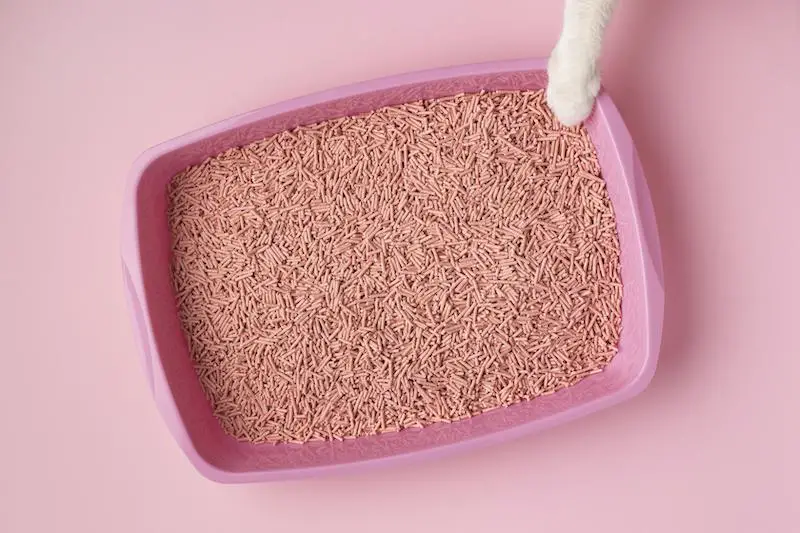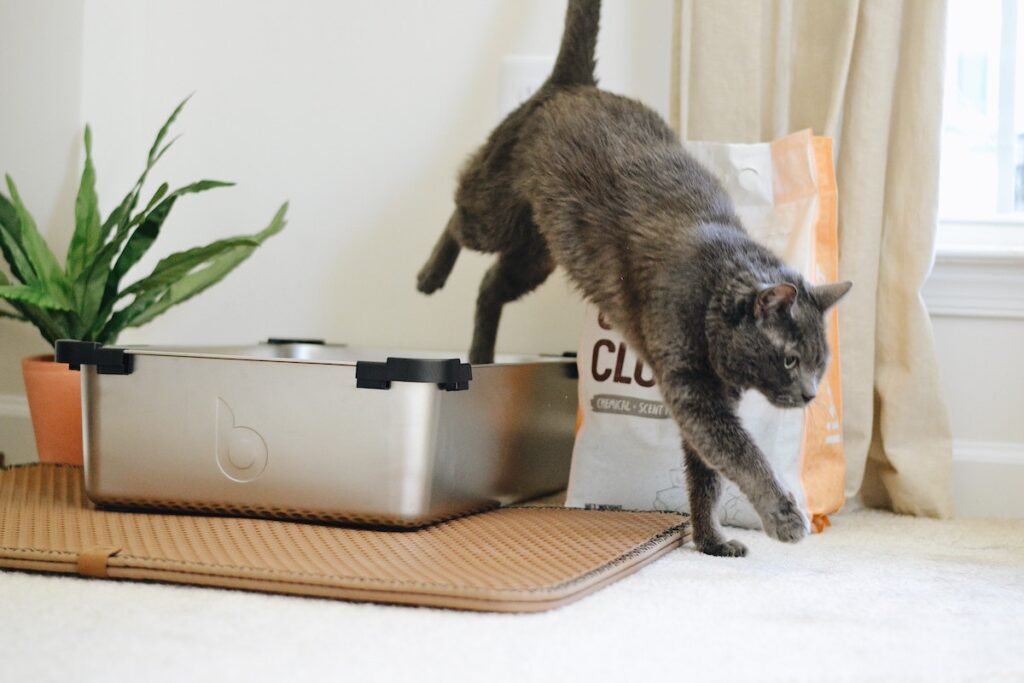It can seem like strange behavior for your cat to pee outside the litter box, but in reality it’s actually a really common issue cat owners experience. While some reasons for peeing outside the litter box are purely psychological, others are caused by medical reasons and may require a vet visit to get to the bottom of.
1. Environmental Stressors
Every cat is different, including what stresses them out. Only you know your cat’s routine and preferences best; think about whether anything has changed that could trigger your cat to pee outside the litter box. For example, have you started traveling more recently and leaving the cat alone at home? Have you introduced new pets or people into the household? Changes can be stressful and scary for a cat, and a common response is to pee outside the littler box because their sense of safety has shifted.
Some other changes that might cause them to pee outside the litter box include: new odors, or materials, rearrangement of furniture or household items, changes in behavior of existing pets or people, existing people or pets leaving, changes in routines, changes in diet.
If peeing outside the litter box has been an ongoing issue for some time, getting to the root of the issue might be a little more challenging because you don’t have a base of comparison. However, there are still some common things that will cause most cats to pee outside the litter box that are a good starting point. These include: availability and location of food and water, whether the cat has a place of safety (boxes, cat post, cat house), if there are other pets or people antagonizing the cat, whether the cat has people or toys to keep her occupied.
Pay attention to other signals of distress besides your cat peeing outside the litter box. Are they excessively vocal or quiet at certain times or after certain events? Do they seem to hide from certain people or pets? Are there certain areas of the house they never go to?
Piecing together the mystery of what stressors are causing your cat to pee outside the litter box is difficult. But with careful observation you can likely find the culprit or culprits.
2. Medical Issues
Another very common cause of peeing outside the litter box is medical issues. The most common medical issue causing peeing outside the litter box is feline lower urinary tract disease or FLUTD. This is a general medical term used to describe any urinary tract disease.
More specifically, Feline Idiopathic Cystitis is the most common form of FLUTD in cats and the number one cause of peeing outside the litter box. This disease causes painful inflammation that leads to loss of bladder control, and in more severe cases can result in blockage and death. One symptom specific to Feline Idiopathic Cystitis is peeing on cool, smooth surfaces like a tile or bathroom floor.
Other medical reasons your cat might be peeing outside the litter box include:
- Diabetes
- Arthritis pain (this can make it too painful for the cat to get to the litter box quickly)
- Cognitive dysfunction such as Dementia
- Dental Disease – cats with tooth resorption and loose teeth have been known to pee outside of the litter box due to distress and discomfort
- Post-declaw pain can be low in severity and chronic; your cat may be walking normally but avoids jumping up / down into the tray
- Blindness from retinal detachment, diabetes, or old age
- Chronic kidney failure

3. Litter Box Problems
One often overlooked reason for peeing outside the litter box is the litter box itself. If a cat deems the litter box unusable or unsafe for some reason, they simply will avoid it.
Perhaps the most common cause of this is the litter box not being cleaned regularly enough. Cats know when their litter box is unsanitary and cleverly know to avoid it. You should be cleaning the litter box at least once every three days (if you have one cat) and deep clean it once per month. Deep cleaning involves completely tossing out all the litter, cleaning and sanitizing the inside of the box and refilling it with fresh litter.
Another reason your cat might be avoiding the litter box and peeing elsewhere might be that they don’t like the feel or smell of the litter or the litter keeps getting caught between their toes. Try different varieties of litter to see if that makes a difference.
Finally, the litter box need to be in a place the cat feels safe to use it. Try getting a litter box with a lid and placing it in a corner or behind something; generally in a place people or other pets don’t go. Peeing outside the litter box might just be your cat trying to find a safer place to pee.
We’re going to elaborate more on this one as it’s a pretty big reason for cats peeing outside the litter box. Consider whether there are people or other pets in the house that are antagonizing or threatening your cat. Other creatures are a huge cause of distress in cats as they can be constant and severe triggers.
4. People or Other Pets
Does your cat have a way to get away from other pets in the house? Do they have an area they can go where they feel completely safe? If not, you may want to consider carving out an area only they can get to that other pets cannot.
With regards to people causing the cat to pee outside the litter box, remember that your best intentions might cause distress to cat. Picking up, touching, playing with a cat when they want to be left alone can be stressful. If you think people might be the problem, try backing off a little and engaging more with the cat only when they want to be approached.
5. Territorial Behavior
Cats can be territorial like many other animals, and this might be causing them to urinate outside the litter box.
The main way to tell if the behavior is territorial is if they are spraying. Normal peeing results in a puddle on the floor, while spraying causes a scatter of pee on a vertical surface such as a wall or couch. This is a way cats, especially male cats, mark their territory.
You can reduce spraying behavior by neutering your male cat, and by creating areas of the house that are reserved only for them. If your cat feels like they don’t have a place of their very own in the house, they might start to spray to mark a territory.














